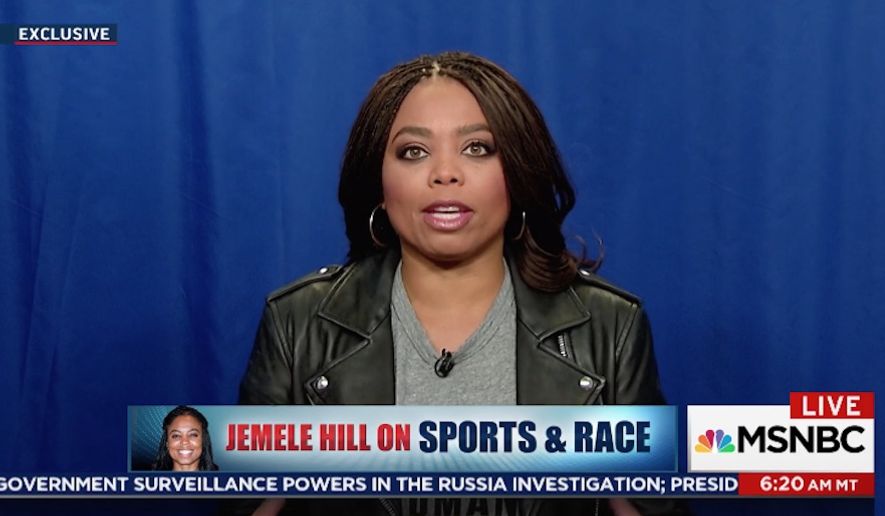OPINION:
Jemele Hill, the former ESPN star who famously slammed President Donald Trump as a “white supremacist” on Twitter, has a piece coming out in October in her new place of employment, The Atlantic — and if hating on Caucasians is your thing, it won’t disappoint. The title?
Only this: “It’s Time for Black Athletes to Leave White Colleges.”
Hill couldn’t be happier.
“Very proud that my first magazine piece for @TheAtlantic is appearing in the October issue,” she tweeted. “Been working on it for some time. Here it is.”
And she linked to it.
And readers, beware. The text doesn’t disappoint the title.
Here’s one line: “[S]ome black students feel safer, both physically and emotionally, on an HBCU campus — all the more so as racial tensions have risen in recent years. Navigating a predominantly white campus as a black student can feel isolating, even for athletes.”
HBCU, as she helpfully explains in the first paragraph, is short for Historically Black College or University.
But yikes, right? Her point of view could just easily apply to whites navigating a campus dominated by blacks — that the white student could feel isolated, even if an athlete. Only saying so would incur angry leftist accusations of racist, racist, racist.
“Top black athletes,” Hill continued, “used to go to black colleges.”
So, too, top black students — in high school and elementary school, both. It was called, da dum, dum, dum: segregation.
And it was deemed racist.
And rightly so.
Yet this is precisely what Hill is calling for — segregation. Though in her world, it’s “collectively” decided, and it’s decided by the blacks themselves, so therefore, it’s automatically not the racist kind of segregation.
“[W]hat if a group of elite athletes collectively made the choice to attend HBCUs? Black athletes overall have never had as much power and influence as they do now,” she wrote. “This gives them leverage, if only they could be moved to use it. … The flight of black athletes to majority-white colleges has been devastating to HBCUs. … Today, most blue-chip recruits in football or basketball don’t even consider attending black colleges.”
But that’s the free market for you.
Historically black universities have to learn to compete, same as — for lack of a better phrase — historically white universities.
“To attract the best football and basketball players in the nation, HBCUs have to spend money to improve their facilities — but to generate the athletic revenue necessary to improve their facilities, the colleges need more of the best players,” Hill wrote.
That’s speaking the obvious.
But Hill meant it as a complaint.
And she brought it to the forefront as a way of circling around to her main point: that blacks should boycott universities dominated by whites.
Her point about larger, better funded universities scooping all the talent from smaller, lesser funded facilities is valid. It happens all the time — sometimes, tragically so. But it’s the same point that can be made about the loss of Mom & Pop shops to Walmart; the loss of a company’s top CEO to a headhunter and better opportunity; the loss of Pepsi’s grocery shelf space to Coke’s.
That’s competition. That’s capitalism. That’s freedom and free choice. That’s reaching for the dream — and winning.
That’s not a black-white thing.
What Hill wants? What she’s recommending?
It’s racist. Segregation is segregation is segregation, no matter which race is calling for it. And segregation based on skin color is, simply put: racist.
• Cheryl Chumley can be reached at cchumley@washingtontimes.com or on Twitter, @ckchumley.




Please read our comment policy before commenting.